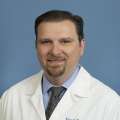On paper, there was nothing about Hilary Witbrodt that put her in a higher risk category for colorectal cancer.
She was incredibly fit – an endurance sports enthusiast who regularly competed in adventure racing: a combination of mountain biking, outrigger paddling and distance running. Her diet was high in whole grains and fruits and vegetables and low in processed foods. And she had no family history of colorectal cancer or related polyps, nor any personal history such as prior inflammatory bowel disease.
Plus, she was only 41 – still several years away from starting regular preventive screenings.
But in November of 2022, Witbrodt started noticing blood in her stool. “You don’t think it’s going to be anything serious,” she recalled.
When she mentioned her symptoms to a friend on her outrigger paddling team, her friend, who had ulcerative colitis (an inflammatory disease), noted that the symptoms sounded similar. Witbrodt looked up the condition and was somewhat reassured. With the holidays approaching, she decided to wait a few weeks to see if her symptoms resolved.
By January, though, there hadn’t been any improvement. She was able to book a February telehealth appointment with a local gastroenterologist, near where she lives in Oxnard, but then was told she’d have to wait three more months for a colonoscopy. By then, though, “I knew something wasn’t right,” she recalled. She called regularly to check for cancellations and was able to get the procedure moved up to April.
Witbrodt was still groggy after waking up from the colonoscopy when she was informed that a tumor had been detected. Although it still needed to be biopsied, it was most likely cancer.
Suddenly, Witbrodt’s cancer journey had kicked into high gear.
Colorectal cancer screening — which for most people should start at age 45 — saves lives by catching cancer early.
Learn more about colorectal cancer screening at UCLA Health
Adjusting to a shocking diagnosis
Witbrodt’s gastroenterologist immediately referred her to UCLA Health hematologist and oncologist in Ventura.
At Witbrodt’s first appointment later that month, Dr. Benjamin shared the biopsy results, which showed stage 3 rectal cancer. Cancer had been found in the rectum, the final part of the large intestine that connects to the anus (the exit point for solid waste), but had also been detected in some of the adjacent lymph nodes. There was also a possibility that it had spread to her liver, but further testing found that the spot detected there was a benign mass called a hemangioma.
Nevertheless, given the cancer’s stage, the treatment recommendation included a combination of radiation and chemotherapy, known as total neoadjuvant therapy, before undergoing surgery.
Devising the appropriate treatment plan in a case such as Witbrodt’s takes “a team approach,” said , a colorectal surgeon at UCLA Health and clinical professor of surgery at the . “You have a medical oncologist, a radiation oncologist and a colorectal surgeon who devise the best strategy for your particular tumor and the anatomy related to it. This multidisciplinary team, which also includes an expert radiologist, pathologist, and genetic counselor, collaborates in a conference setting to review the patient’s cancer diagnosis and provide the treatment recommendations for optimal outcomes.”
Undergoing chemotherapy and radiation first for rectal cancer can sometimes shrink the tumor completely where no viable cancer remains and possibly eliminate the need for surgery – an important consideration, Dr. Kazanjian said, given the functional implications of rectal surgery. And even if not, the preoperative regimen reduces the chance of cancer recurrence and can enhance the success of surgery, he said.
Witbrodt’s regimen included five days of radiation, followed by six rounds of chemotherapy. “I thought, ‘I’m going to work out all through chemo, it’s going to be great,’” she said, “but I was pretty tired.” Her exercise routine downshifted to walking her golden retriever, Kobe. “I live in a townhome, so he requires four walks a day,” she explained. “We’d walk at ‘dog pace,’ but that was kind of my saving grace for exercise.”
During this initial round of treatment, Witbrodt, a research and development manager at a chemical company, was able to work remotely.
In addition to gastrointestinal side effects from the chemotherapy, she had others that were perplexing, such as intense jaw pain when she took a bite of food that lessened with further bites.
Fortunately, there were others Witbrodt could turn to for advice, including a friend who’d had stage 3 rectal cancer five years earlier and helped her connect with other cancer survivors. “That was probably one of the most helpful things,” Witbrodt said, “knowing someone who knew exactly what I was going to go through.”
By talking with others who’d been through treatment, Witbrodt quickly learned that the “first bite” pain she was experiencing had a name, first bite syndrome, and was common during chemotherapy but would subside quickly.
Regaining a sense of independence
After completing the last round of chemotherapy, Witbrodt had another CT scan, which showed that the tumor had shrunk considerably but was still present.
In November of 2022, she underwent a five-hour surgery at Ronald Reagan UCLA Medical Center to remove her rectum and the adjacent affected lymph nodes. Known as a low anterior resection, or total mesorectal excision, the surgery was done robotically; it also included replacing the rectum with a portion of the colon.
“The colon is moved down to reattach to the anus,” Dr. Kazanjian explained, “so the passageway, or plumbing, is intact, but it’s the colon acting as a substitute for the rectum.”
Witbrodt was able to go home just two days later. As part of the surgery, she received a diverting ileostomy, so that stool would be redirected to an exterior bag affixed to her abdomen while the reconstructed rectal area healed. For Witbrodt, the ileostomy bag was a dramatic improvement. During her chemotherapy treatment, she’d had frequent diarrhea and didn’t feel confident out in public; with her ileostomy bag, she felt that she could go out again.
The hardest part was finding clothing that would accommodate the bag, she recalled, given that most pants were too high-waisted and interfered with the bag.
Witbrodt returned to work at the office and eased back into an exercise routine, using a rowing machine at home and even venturing out on her mountain bike and in her outrigger canoe.
The next step, reversing the ileostomy, would take at least three months, she knew, and might require a lengthy convalescence before she’d feel confident enough in public again.
After a barium enema study to verify that the area had healed and wouldn’t leak stool, Witbrodt had surgery to reverse the ileostomy, in March 2023.
“I alternated between constipation and diarrhea for a couple of weeks,” Witbrodt said, “and then things slowly started to improve.
Since then, not feeling tethered to the bathroom has also allowed Witbrodt to return to more strenuous activities: She's back to regular training with her outrigger team and ran a 5K race in December.
Even more important: her follow-up scans, lab work, and one-year colonoscopy following the initial surgery have all come back clear. She continues to see Dr. Benjamin every four months and has surveillance CT scans every six to 12 months.
Being alert to symptoms
Although colorectal cancers were once seen primarily in older adults, with the risk increasing with age, diagnoses like Witbrodt’s have become increasingly more common. As a result, the recommended age to begin is now 45, down from 50.
“We’ve seen a substantial rise in the incidence of young onset colon cancer, especially rectal cancer,” Dr. Kazanjian said. Moreover, while it’s often assumed there must be some family history, “for the vast majority of our patients diagnosed in their 30s or early 40s, it turns out that they don’t have any identifiable genetic risk factors or any family history.”
That’s why paying attention to symptoms is so essential, Dr. Benjamin said.
“If you have a symptom that doesn’t go away within a couple of weeks and isn’t something you’ve had in the past, see a doctor,” she said. You don’t want to necessarily assume the worst, she pointed out, but you do want to have it ruled out.
“If you’re having bleeding,” she said, “that’s not normal. Instead of thinking ‘this is probably nothing,’ you need to investigate it.”
Witbrodt echoed that advice, adding, “just because you don’t fit the mold doesn’t mean that the chance is zero. You can do everything right and you’re only reducing your risk – your risk is never zero.”
Even so, she emphasized, “Doing your best before you’re faced with a cancer diagnosis gives you a lot better chance that you’re going to get through it with fewer issues. Being fit and healthy really made a difference in how well I managed through all of the treatment.”





